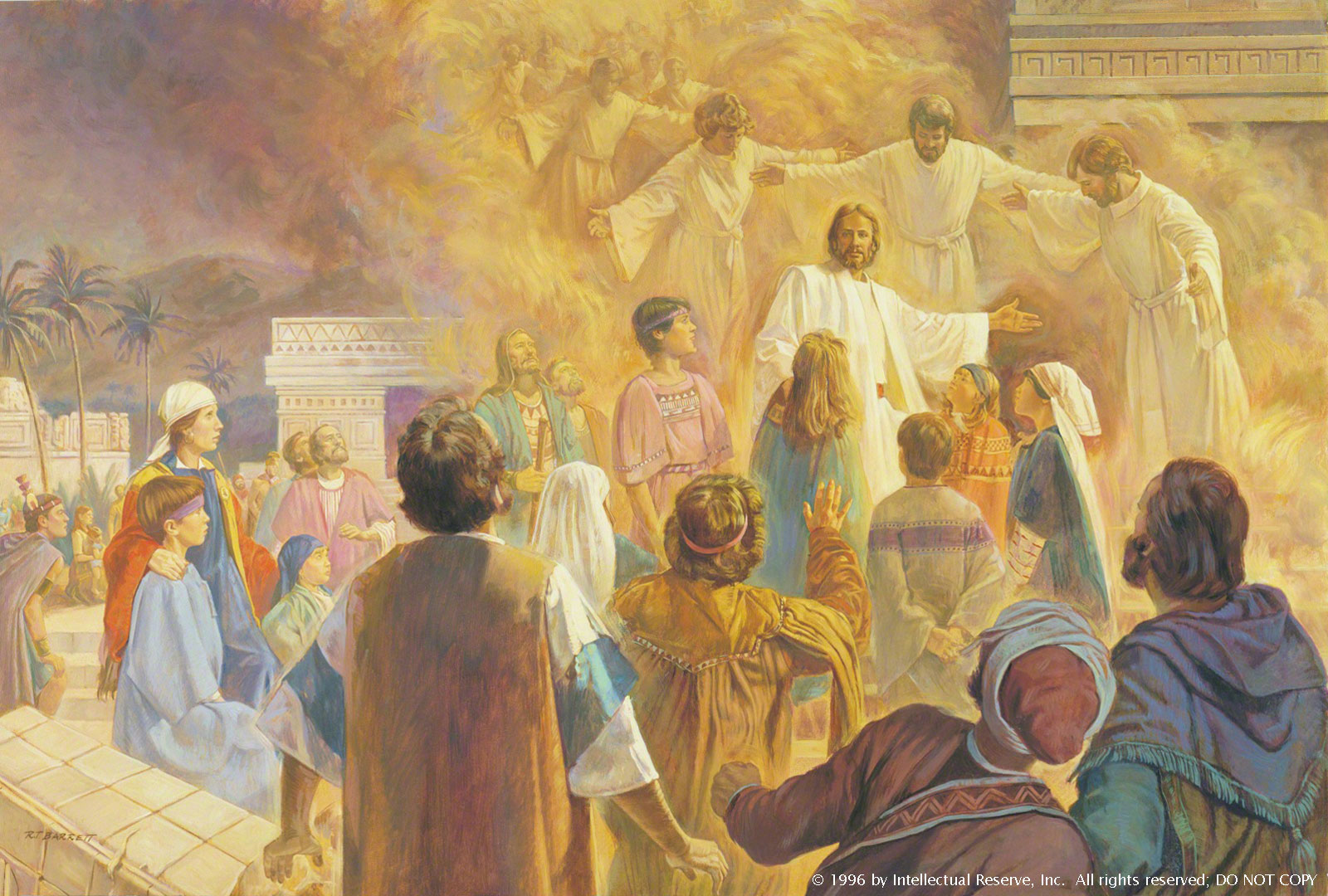To accompany your Come Follow Me study for October 7-13
You will enjoy the following related videos this week:
You may also wish to consult the related commentary in the Book of Mormon Institute Student Manual:
- Chapter 42: 3 Nephi 15–17 (churchofjesuschrist.org)
- Chapter 43: 3 Nephi 18–19 (churchofjesuschrist.org)
If you would like a Kahoot game related to this material which you could use for personal study or use with your family or your class, click here: https://create.kahoot.it/share/3-nephi-17-19/820d9cd5-05eb-4277-a032-d2b187ec670d. To use it with a group, after clicking on this link, you will need to log into Kahoot, creating a free account if you have not done so previously, then click on the blue “Host Live” button or the gray “Assign” button, depending on how you wish to use the Kahoot. Some of the Kahoot questions may presuppose that the player has read through the suggested answers to the following Points to Ponder and at least has browsed the Institute student manual as well.
Points to Ponder in 3 Nephi 17-19
Chapter 17
1. Why, when Jesus found people didn’t understand all he was telling them, didn’t He just explain it again in simpler terms rather than tell them just to go home and think about it, especially when on other occasions He was willing to “expound all things”? (17:2‑3; 26:3)

2. Why would Jesus bother to heal bodies (17:7) when He could have been focusing on their spiritual needs
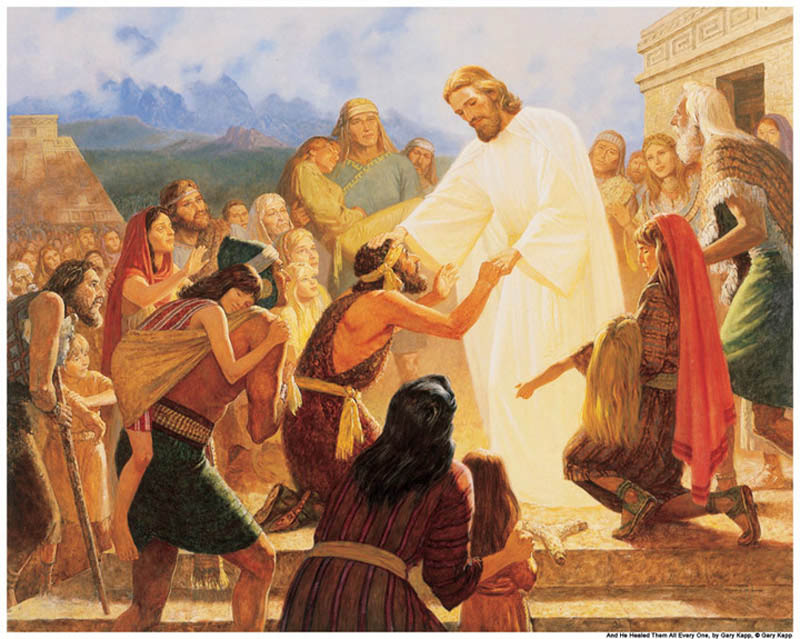
3. (17:8) Are healings dependent upon
a. the faith of the one who is sick
b. the faith of the one who is administering
c. the will of God
d. all of the above
4. After assembling the Nephite children and prior to blessing them, Jesus knelt and prayed in front of everyone. Why would the first thing He said in His prayer be “Father, I am troubled because of the wickedness of the people of the house of Israel”? And if they were so wicked, how could He get up after His prayer and say, “Blessed are ye because of your faith”?

5. Why do you suppose Jesus paid so much attention to children in these chapters?

6. What do you think the purpose may have been in having the little children surrounded by angels and fire? Wouldn’t this have scared them?
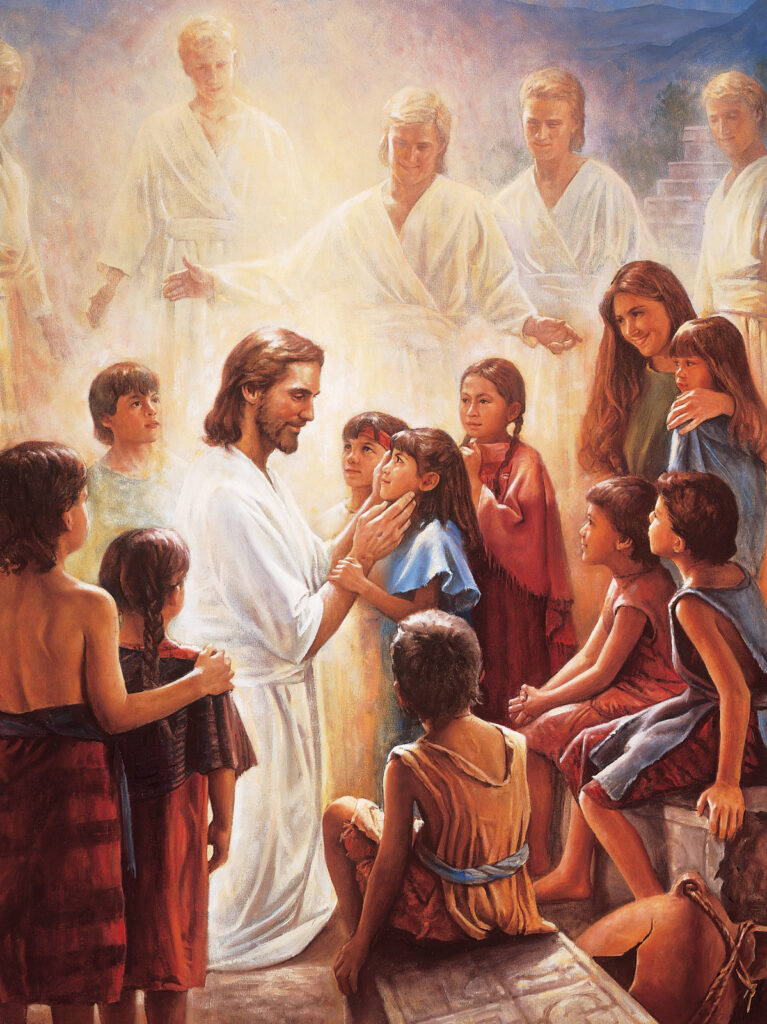
7. How long do you guess it may have taken for Jesus to bless the little children one by one and pray unto the Father for them? What mathematical formula did you use to arrive at your estimate?
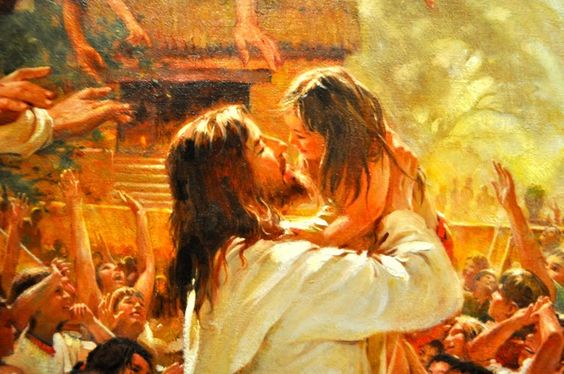
Chapter 18
8. Why did the multitude in 18:5, 9 eat so much sacrament bread and drink so much wine that they were filled? How did they avoid indigestion and intoxication? Why are we given just a tiny piece of bread and cup of water today?
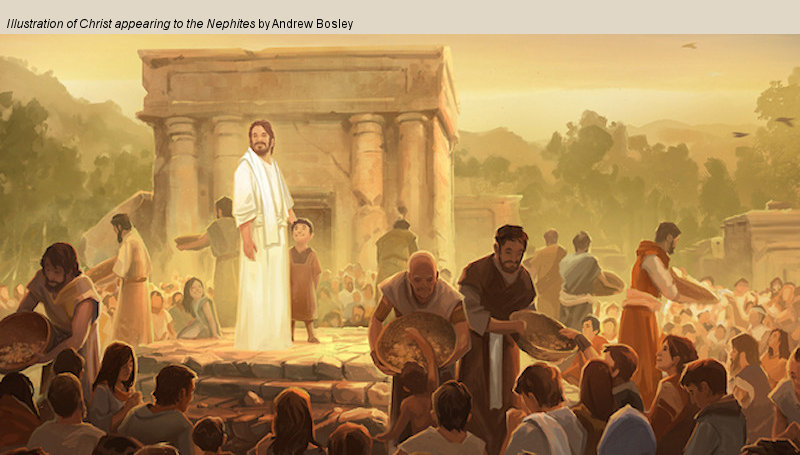
9. What was the simplest recipe Jesus gave for always having His Spirit with us? Aren’t there other prerequisites as well?
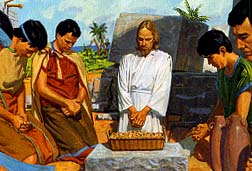
10. What have you personally found helpful in making the ordinance of the sacrament spiritually meaningful week after week?
11. What does it mean to take the sacrament unworthily? When should one refrain from taking the sacrament? When should we warn someone else not to partake? Should a non‑member take it? A small child?
12. What do you find most impressive about Jesus’ counsel on prayer in 18:15‑21?

13. What passages in 18 would you guess would be most frequently quoted in leadership meetings in the Church? Why?
Chapter 19
14. What impressive principles of leadership and administration do you find in chapter 19?
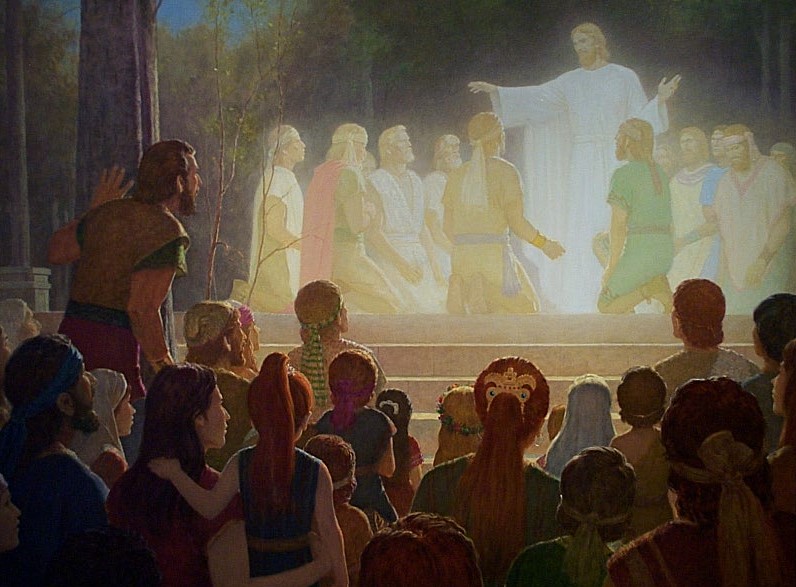
15. Why is Nephi just now getting baptized, if he was already the prophet leading the Church at the time Jesus came?

16. How was it possible for the 12 disciples to each give an extended discourse in the very same words Jesus had used (19:8) if they didn’t already have the Holy Ghost? (19:9)
17. If it was okay for the Nephites to pray directly to Jesus, is it okay for us to do the same? Why or why not? If a woman feels she has a particularly close relationship to her Heavenly Mother, is it okay for her to pray to Her?
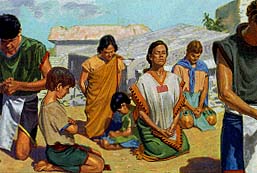
18. What significance do you see in the fact that this chapter twice mentions Jesus as smiling? Do you think He even laughed sometimes? Why or why not?

19. What other points in these three chapters do you feel are worth emphasizing?
Possible Answers to Points to Ponder in 3 Nephi 17-19
Chapter 17
1. Why, when Jesus found people didn’t understand all He was telling them, didn’t he just explain it again in simpler terms rather than tell them just to go home and think about it, especially when on other occasions Je was willing to “expound all things”? (17:2‑3; 26:3)
Until we are prepared spiritually, we cannot understand spiritual things even if they are expounded. Jesus recognized that these people needed to ponder individually to be ready to receive what He had to impart to them the next day.
2. Why would Jesus bother to heal bodies (17:7) when He could have been focusing on their spiritual needs?
One whose physical needs are unmet is not usually prepared to focus on spiritual things. The Savior’s healing miracles (1) were a comfort and blessing to those in need, (2) served as a sign of who He really was, and (3) eliminated a distraction so that those blessed could be more receptive to the rest of His message.
3. (17:8) Are healings dependent upon (a) the faith of the one who is sick, (b) the faith of the one who is administering, (c) the will of God, (d) all of the above
All of the above may be factors, though 17:8 suggests that the faith of the one being blessed is primary.
4. After assembling the Nephite children and prior to blessing them, Jesus knelt and prayed in front of everyone. Why would the first thing He said in His prayer be “Father, I am troubled because of the wickedness of the people of the house of Israel”? And if they were so wicked, how could He get up after His prayer and say, “Blessed are ye because of your faith”?
We can only guess at the answer to this question. Perhaps as He prepared to bless such pure and innocent children, He was troubled to think of how many other children around the world, including specifically those of the House of Israel, would not be so blessed, in part because of the wickedness of their parents.
5. Why do you suppose Jesus paid so much attention to children in these chapters?
See the following short video for some ideas on the subject:
6. What do you think the purpose may have been in having the little children surrounded by angels and fire? Wouldn’t this have scared them?
Certainly, the Lord would have blessed those children with the comforting presence of His Spirit to reassure them. His surrounding them with angels and fire is probably at least as much for the benefit of the onlookers as it is for the children themselves., a sign of their purity and worth before God.
7. How long do you guess it may have taken for Jesus to bless the little children one by one and pray unto the Father for them? What mathematical formula did you use to arrive at your estimate?
Your choice. If the total audience was 2500, if 400 were “little children,” and if the Savior took only 30 seconds to bless each, it would have taken 3 hours and 20 minutes. If He spent a full minute on each child, it would have taken 6 hours and 40 minutes, on top of the hours He had already spent letting each of the 2500 see one by one the wounds in his hands and feet. What a lesson about the importance of treating each person as an individual!
You may enjoy the following short video on Jesus’ ministering one by one to the Nephites:
Chapter 18
8. Why did the multitude in 18:5, 9 eat so much sacrament bread and drink so much wine that they were filled? How did they avoid indigestion and intoxication? Why are we given just a tiny piece of bread and cup of water today?
We must assume that they were “filled” with the Spirit, not with bread and wine, though it is quite possible they were allowed to eat and drink more than we do today. Today, for practical and logistical reasons, we partake of only a small piece of bread and small cup of water as a symbol of the flesh and blood of Christ. Obviously, it is not the ingesting of the food and drink that benefits one but the covenant he makes in the process.
9 What was the simplest recipe Jesus gave for always having his Spirit with us? Aren’t there other prerequisites as well?
He promised that if we would always remember Him, we would always have His Spirit to be with us. (18:7) Presumably, if we constantly focus on the Savior, we will do all of the other things necessary to make us worthy of His constant companionship.
10. What have you personally found helpful in making the ordinance of the sacrament spiritually meaningful week after week?
Your choice. Certainly, it takes some concentration and effort. Possibilities could include:
- Thinking of the words of the sacrament prayers and their significance
- Reviewing the words of the sacrament hymn
- Thinking of changes we need to make in our lives to more fully keep the covenants we have just made (or renewed)
- Thinking of relevant scriptures
- Thinking of the enormity of the Savior’s sacrifice and the profundity of His love that moved Him to suffer for each of us
You may enjoy the following short video relating to the difference between the symbolism Jesus pointed out in the sacrament to His Old World disciples and those of the New World:
11. What does it mean to take the sacrament unworthily? When should one refrain from taking the sacrament? When should we warn someone else not to partake? Should a non‑member take it? A small child?
The greatest requirement for taking the sacrament worthily is being sincere about the promises one makes when taking it. If he is really willing to take upon him the name of Christ, always remember Him, and keep His commandments, it would appear that he is “worthy” to partake, provided he is not guilty of such serious unrepented sins as would call his Church membership or fellowship into question. The scriptures seem to place the burden on each individual to determine whether or not he is worthy, as well as on priesthood leaders to restrict certain individuals whose repentance from serious transgression is not yet complete. There is no reason to think He intended each of us to slap the hands of the person next to us if he tries to take the sacrament when we think he shouldn’t.
There can be no harm in a non-member’s taking the sacrament, if he really wants to make the promises implied thereby. For small children it, is a teaching moment and a good habit for them to form, even if they have not yet been baptized. We often think of the sacrament as a renewal of baptismal covenants, but presumably baptism could itself be a “renewal” of covenants first made by a child or a non-member in taking the sacrament.
12. What do you find most impressive about Jesus’ counsel on prayer in 18:15‑21?
Your choice. I am struck by the fact that the Savior twice mentions the need to pray always as a protection against the temptations of Satan, who desires our destruction. I am also impressed by the specific promise in verse 20 that “whatsoever ye shall ask the Father in my name, which is right, believing that ye shall receive, behold it shall be given unto you.” I also like Jesus’ emphasis on family prayer in addition to individual prayer.
You may enjoy the following short video related to Jesus’ admonition to watch and pray always:
13. What passages in 18 would you guess would be most frequently quoted in leadership meetings in the Church? Why?
Your choice. Certainly 18:32 has been quoted frequently in the context of our responsibility to “continue to minister” to the less active who may resist our initial advances.
Chapter 19
14. What impressive principles of leadership and administration do you find in chapter 19?
Your choice. One obvious possibility is 19:3, which tells of the people’s laboring all night to get good attendance at the following day’s meeting.
15. Why is Nephi just now getting baptized, if he was already the prophet leading the Church at the time Jesus came?
Just as Nephi was ordained again in chapter 11, so now he is baptized again—perhaps as an example, perhaps to signal the new dispensation which has just been ushered in, just as early converts were baptized a second time once the Church was organized and again after moving west.
16. How was it possible for the 12 disciples to each give an extended discourse in the very same words Jesus had used (19:8) if they didn’t already have the Holy Ghost to help them remember so much? (19:9)
They had to have had the presence and influence of the Holy Ghost in verse 8 to remember so much, but now they desired the “gift” of the same, as opposed to what we might call the “loan.”
17. If it was okay for the Nephites to pray directly to Jesus, is it okay for us to do the same? Why or why not? If a woman feels she has a particularly close relationship to her Heavenly Mother, is it okay for her to pray to her?
The Nephites “prayed” to Jesus because He was there with them. Essentially, it was a conversation, which was appropriate enough then, but under current circumstances we have been asked to pray to the Father, not the Son, and not to our Heavenly Mother.
18. What significance do you see in the fact that this chapter twice mentions Jesus as smiling? Do you think he even laughed sometimes? Why or why not?
Jesus appropriately showed his joy through His smile, just as His disciples should be the happiest (and smiliest!) of all people. There is no record of His ever laughing, though it is certainly conceivable that He could have done so under the same circumstances as His prophets today sometimes laugh, in appropriate ways and at appropriate times. The scriptures do remind us that “much laughter” is sin. Interestingly, it is the devil who is recorded in scripture as “laughing.” Too much laughter can be a sign of inappropriate light-mindedness and rather than be an accompaniment of true happiness can be in impediment.
19. What other points in these three chapters do you feel are worth emphasizing?
Your choice. I might mention the following:
- Jesus went to the lost tribes of Israel, who must have kept records of the visit that we’ll someday get to read. (17:4)
- Some things cannot be shared verbally but must be felt. [17:16-17; 19:32-34]
- Jesus has set an example for us to follow. [18:16]
- We are to be more like mirrors than lanterns. [18:24]
- The importance of record keeping in the Church. [18:31]
- The importance of activation work. [18:32]
- Another reminder about disputations. [18:34]
- A pattern for the efforts we should make to get people to stake conference. [19:3]
- Nephi had raised his brother from the dead. [19:4]
- The thing the disciples most desired was that they might have the Holy Ghost. [19:9]
- Angels come down and minister to the disciples. [19:14]
- The importance of unity. [19:23]
- It was given to the disciples what they should pray. We can aspire to reach the same point. [19:24]
- Miracles are conditioned on faith. [19:35]
- The joy the multitude felt as they met with Jesus at the temple can be a parallel for the joy we can find in temple work.
See also the following short video on the subject:
